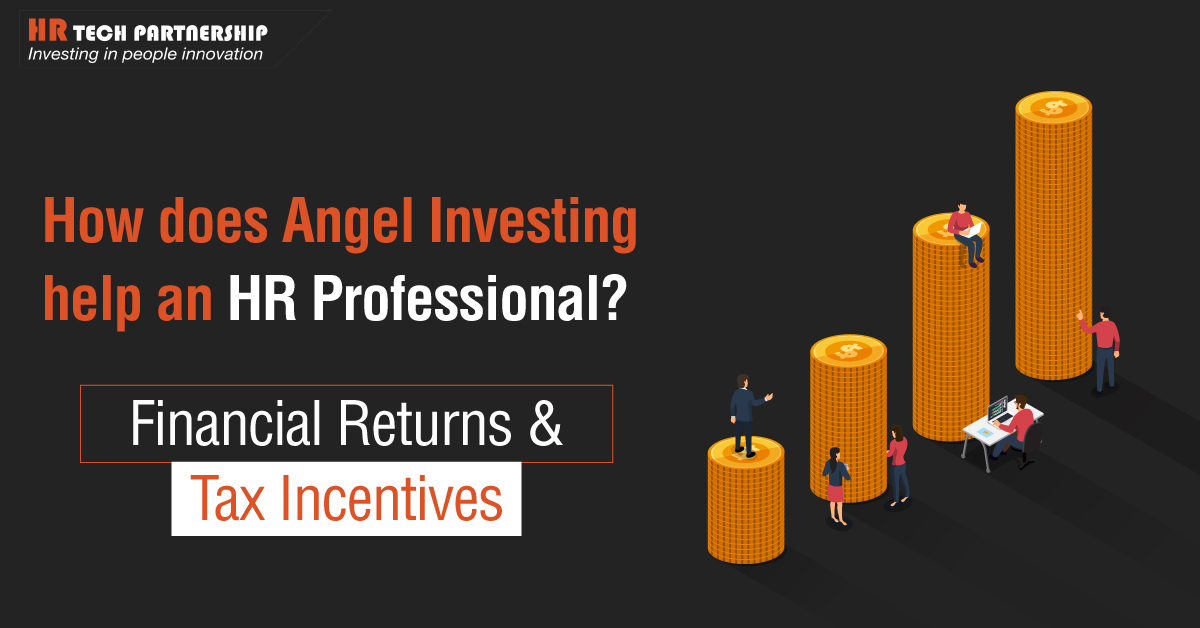Angel investment in HR Tech is proving to be popular! Recently angel investment in the HR Tech space has seen a lot of momentum. CB Insights Research shows that barring 2016 and 2017 angel funding has seen a consistent growth of 15% over the past decade touching $2.9billion at the end of 2018. Generally, two thirds of all funding deals have happened in the early stages of a start-up covering angel, seed or series A rounds. There is no doubt that the technology boom is creating a raft of start-ups who have the ability to grow rapidly.
Advantages to an HR professional as an Investor
Specifically, an HR professional can hope to gain on three areas by being an angel investor:
- Financial returns & Tax Incentives
- Improved commercial acumen
- Deeper understanding of how the HR function can get future ready
So why is investing in start-ups a financial incentive for HR professionals?
Most start-ups have an accelerated pattern of revenue return. An annual growth rate of 50-200 % (on an average) ensures any investor has the potential to get multiple returns on their investment in a very short period of time. A key risk is backing the right horse (data proves that only one in 10 start-ups manage to be successful). HR professionals can feel more confident by investing in a HR start-up as they are familiar with the space and can gauge if it truly addresses a real- life issue. Doing it in the company of other experienced HR investors helps them further lower their risks as they can validate their judgement.
Tax Incentive
Governments in most developed countries are providing attractive tax incentives around investment in start-ups as they have realised that spurring digital innovation is a key competitive advantage. In the UK, there are five key tax advantages via the EIS/SEIS scheme:
- Up to 30%-50 % off your income tax bill, via income tax relief. You can also carry back the same to a previous tax year. This can provide a double advantage of increasing financial returns and reducing tax liabilities.
- Tax-free growth – no capital gains tax to pay on EIS/SEIS gains which reduces future tax liability
- Defer capital gains you have made elsewhere, until you sell the EIS/SEIS
- Loss relief – offset EIS/SEIS losses against income or capital gains tax. So in the event you do lose money on an investment you can still use it advantageously
- Free from inheritance tax . If the EIS/SEIS is held for at least two years and you still hold it on your death, your family need not pay tax for inheriting the benefit. This is particularly attractive if you are looking to pass on the investment benefits to your family. (NB -Tax treatment depends on the individual circumstances of each client and may be subject to change in future.)
In summary, strong financial returns and attractive tax incentives are a key reason why HR professionals should be looking to angel invest in HR start-ups. If sound judgement is applied there is every possibility of getting a substantial return on your investment.
In this article we discussed how it is advantageous for HR professionals to get better financial returns by being angel investors. Our next blog in this series over the following days will delve deeper on the other two aspects (develop commercial acumen and become future ready).
The London based HR TECH Partnership is an investment venture in the People Tech space with most of its stakeholders being senior HR directors. It is an early stage investor and focuses on AI based HR start-ups around Talent and Workplace productivity. To know more about angel funding and how the HR TECH Partnership works visit – www.hrtechpartnership.com or write to invest@hrtechpartnership.com.

